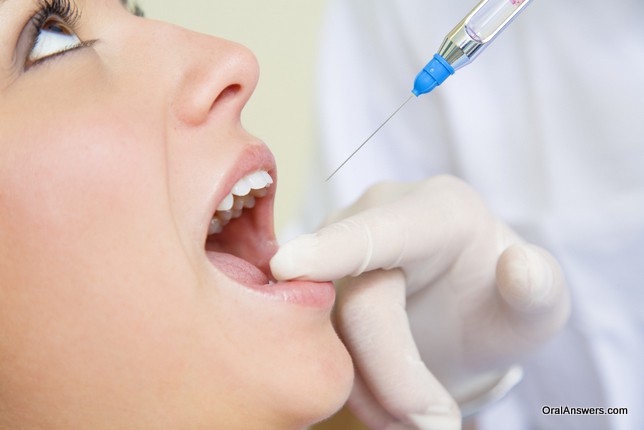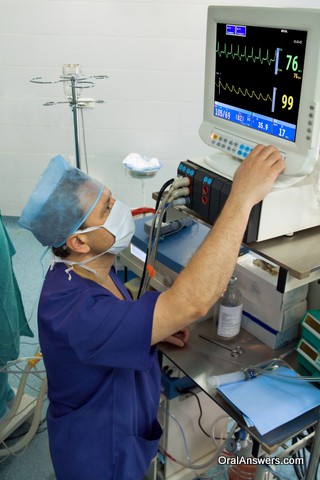Back when I was in dental school, the instructors told us to always pull back on the anesthetic syringe before injecting. By doing this, we would make sure that we weren't injecting the anesthetic into a blood vessel, which would cause the epinephrine in the anesthetic to make the patient's heart feel like it was beating out of their chest.
They called this the epinephrine reaction, and I blindly believed it. I even wrote a post about why dental anesthetic makes your heart beat faster. Until one day, this belief was questioned by a comment on that article (which actually caused Gavin to post a rather entertaining comment). I realized that I'd blindly believed what I'd been taught without doing any research of my own.
In this follow-up article, I'll answer the question: Can dental anesthetic really make your heart beat faster?

A few weeks ago, a woman told me that she hates getting injections because it makes her heart beat really fast. I asked her if a dentist had ever offered her the anesthetic brand Carbocaine (a type of dental anesthetic without any added epinephrine). She told me that she'd never heard of it. I tried it on her and she told me that it was the first injection she could remember where she didn't feel like her heart was beating out of her chest.
Naturally, this (along with other similar experiences) made me a believer that regular dental anesthetic with epinephrine can indeed make your heart beat faster. As a dentist I realize that stories, while fun and exciting, may not be a very good source of evidence, so I decided to do some more in-depth research.
Can Dental Anesthetic Really Make Your Heart Beat Faster?
The main question here is whether or not the small amount of epinephrine inside the dental anesthetic makes your heart beat faster or if it's simply caused by the epinephrine your body releases in response to being afraid of the crazy dentist that's about to poke you.
Many years ago, it was thought that the tiny amount of epinephrine in the dental anesthetic made no difference in your heart rate, and any change in your heart rate was simply caused by the "fight or flight" response.
Many studies have since confirmed that the epinephrine in dental anesthetic can cause an increase in your heart rate.
One study states that "intravenous administration of 0.015 mg of epinephrine with lidocaine results in increase in the heart rate ranging from 25 to 70 beats per minute, with elevations in the systolic blood from 20 to 70 mm Hg." For your information, one cartridge of dental anesthetic contains 0.018 mg of epinephrine — that's even more than the amount that has been shown to increase the heart rate by 25 to 70 beats per minute. Here's a link to one of those studies that discusses this.
Malamed's dental textbook on anesthetic even confirms what I'd discovered. It says, "Contrary to a previously held position that the intraoral administration of "usual" volumes of epinephrine produced no cardiovascular response and that patients were more at risk from endogenously released epinephrine than they were from exogenously administered epinephrine, recent evidence demonstrates that epinephrine plasma levels equivalent to those achieved during moderate to heavy exercise may occur after intraoral injection."
That simply says that the epinephrine in dental anesthetic can make your heart beat very fast, even tricking it into beating as fast as it would if you were exercising.
The author goes on to state that even if your dentist does inject slowly and "pull back" to ensure that they don't inject into a blood vessel, your heart can still beat faster: "However, even following usual precautions (e.g. aspiration, slow injection), sufficient epinephrine can be absorbed to cause sympathomimetic reactions such as aprehension, tachycardia, sweating, and pounding in the chest (palpitation): the so-called "epinephrine reaction."
More Evidence That Dental Anesthetic Can Make Your Heart Beat Faster

Even more evidence that dental anesthetic can make your heart beat faster comes from the American Heart Association. They recommend that any patients with heart disease receive a maximum of 0.04 mg of epinephrine from dental anesthetic. That's usually the equivalent of just two cartridges of dental anesthetic. For comparison's sake, a normal person without heart disease can receive up to eleven cartridges of anesthetic.
This shows that the AHA believes that the epinephrine in dental anesthetic can have an effect on the heart, and that's why they recommend limiting it so strictly.
The textbook Dental Management of the Medically Compromised Patient confirms this by stating "If [a vasoconstrictor] is considered essential, use cautiously (maximum 0.036 mg epinephrine or 0.20 mg levonordefrin)." Levonordefrin is similar to epinephrine, but it is mostly used in European countries, not in the U.S.
Lastly, the American Acamedy of Pediatric Dentists even has guidelines for dentists telling us what to do when a patient has a reaction to the epinephrine in dental anesthetic. They say to reassure the patient, ensure they're breathing well, and to check their vital signs if necessary.
Dental Anesthetic Can Make Your Heart Beat Faster
In summary, the most recent studies and evidence all point to the fact that the epinephrine (or levonordefrin for my European friends) can definitely make your heart feel like its beating out of your chest!
Do you have any questions about dental anesthetic and how it affects your heart? Feel free to leave them in the comments section below. Thanks for reading!
Image Credits: First Image © Diego Cervo/Shutterstock.com, Second Image © beerkoff/Shutterstock.comSource: http://feedproxy.google.com/~r/OralAnswers/~3/tKCeqWe3Kss/
No comments:
Post a Comment